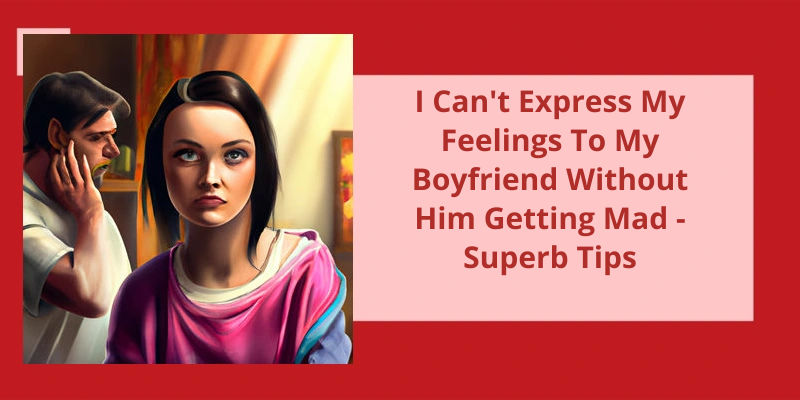Building and maintaining a healthy and open line of communication with your boyfriend is crucial for a successful relationship. However, sometimes expressing your true feelings can be challenging, especially when your partner reacts in anger or defensiveness. If you find yourself in a situation where you can't express your emotions without your boyfriend getting mad, it's important to address this issue to foster a deeper emotional connection. In this article, we will explore some fantastic tips to help you overcome this hurdle and express your feelings effectively to your boyfriend, paving the way for understanding, empathy, and growth in your relationship.
Why Does My Boyfriend Get Mad at Me When I Express My Feelings?
When you express your feelings to your boyfriend and he reacts with anger or discomfort, it can be incredibly frustrating and disheartening. It’s important to remember that everyone processes emotions differently, and your boyfriend may not have the same level of comfort or skill in expressing his feelings. It could be that he simply doesn’t know how to respond or feels overwhelmed by the intensity of your emotions.
One possible reason for his reaction is that he may not feel the same way about you. This can be difficult to accept, but it’s important to confront this possibility. If your boyfriend is unable to express his love and affection for you when you express your feelings, it may be indicative of his true emotions. By avoiding the topic or becoming defensive, he’s essentially telling you that he doesn’t feel the same way towards you.
Communication is key in any relationship, and it’s crucial for both partners to feel comfortable expressing their emotions. If your boyfriend consistently gets angry or shuts down when you try to communicate with him, it may be necessary to reassess the dynamics of your relationship. Healthy relationships are built on open and honest communication, so if your boyfriend is unable or unwilling to engage in this, it may be a red flag.
Instead of assuming the worst, try having a calm and honest conversation with your boyfriend about his reactions. Ask him to explain why expressing your feelings makes him upset and if there’s a way for both of you to find a compromise. He may have valid reasons for his discomfort, such as past trauma or fear of vulnerability. By discussing these issues openly, you may find a way to navigate your emotional landscape together.
In some cases, therapy or counseling can be helpful for couples who struggle with emotional expression. A professional can guide both of you in understanding and expressing your feelings in a healthy and constructive manner. Remember, it’s essential to take care of your own emotional well-being too. If your boyfriend consistently dismisses or invalidates your feelings, it may be necessary to reassess the overall health of your relationship and consider whether it’s meeting your emotional needs.
How to Recognize and Address Toxic Patterns in a Relationship.
- Excessive criticism and belittling of your thoughts or opinions
- Constant control and manipulation
- Isolation from friends and family
- Emotional and verbal abuse
- Physical violence or threats
- Gaslighting and distortion of reality
- Lack of respect for boundaries
- Attempts to control your finances
- Blaming you for their actions or emotions
- Jealousy and possessiveness
- Emotional withholding and silent treatment
- Frequent mood swings and unpredictable behavior
- Disregard for your feelings and needs
- Minimizing or dismissing your concerns
- Patterns of unfaithfulness or infidelity
- Refusal to take responsibility for their actions
- Intimidation and threats to keep you in the relationship
- Enforcement of gender roles and expectations
- Shaming and humiliation in front of others
- Lack of empathy and compassion
Communication is a fundamental aspect of any relationship, but what should you do when your partner struggles to express their feelings? Understanding and supporting your partner’s emotional processes is essential for building a strong connection. One effective way to help them express their emotions is by engaging in regular conversations about feelings. Additionally, paying attention to emotional cues and actively listening can create a safe space for sharing. It’s crucial to accept and validate all of your partner’s emotions, even if they seem negative. Lastly, learning how to manage negative reactions can foster an environment that encourages emotional expression.
What to Do When Your Partner Can T Express Their Feelings?
When your partner struggles to express their feelings, it can be frustrating and challenging for both of you. However, there are ways you can support them in opening up and sharing their emotions. Regularly initiating conversations about emotions can create a safe space for your partner to express themselves. By addressing emotions as a topic of discussion, you can encourage them to open up and share how they feel.
Paying attention to subtle emotional cues can also be helpful in understanding your partners feelings. Sometimes, they may not explicitly state their emotions, but their body language, tone of voice, or actions can provide insight into what they’re feeling. By being attentive and sensitive to these cues, you can gain a better understanding of their emotional state and offer support accordingly.
Another important aspect is acceptance. It’s crucial for you to accept all of your partners emotions, even if they’re different from your own or seem difficult to comprehend. Every person experiences and processes emotions differently, and by accepting their range of emotions without judgment, you create an atmosphere of trust and understanding.
Listening is a crucial skill when helping your partner express their feelings. It involves giving them your full attention, being present in the moment, and actively attempting to understand their perspective. By actively listening, you can demonstrate your support and validate their emotions, fostering a deeper connection and making them feel heard and understood.
Sometimes, negative reactions can discourage your partner from expressing their feelings. It’s important to learn how to manage your own negative reactions and respond in a non-judgmental and supportive manner.
Remember, helping your partner express their feelings is a process that requires time, patience, and understanding. By implementing these tips and continually working on communication and emotional intimacy, you can create a healthier and more fulfilling relationship for both of you.
Strategies for Creating a Safe and Non-Judgmental Environment for Your Partner to Share Their Emotions
- Listen attentively without interrupting
- Show empathy and understanding
- Avoid expressing judgment or criticism
- Create a space free of distractions
- Encourage open and honest communication
- Avoid offering unsolicited advice
- Validate their feelings and experiences
- Show respect for their emotions
- Refrain from belittling or dismissive behavior
- Practice active and reflective listening
- Maintain confidentiality and trust
- Respond with kindness and compassion
- Avoid any form of gaslighting
Source: How to Express Your Feelings and Emotions in a Relationship
These emotions and reactions can stem from a variety of reasons, each painting a different picture of the intricacies within a relationship. Delving deeper into these potential factors allows for a deeper understanding of why your partner may react negatively when you express your feelings.
Why Does My Partner Get Upset When I Share My Feelings?
Communication is the backbone of any healthy relationship, but sometimes expressing our feelings can lead to unexpected conflicts. If you find that your boyfriend gets upset when you share your emotions, it may be due to a number of factors. One possibility is that he’s been hurt by you in the past, causing him to feel insecure and angry. Past experiences can leave emotional scars that make it difficult for individuals to trust and be vulnerable.
It’s essential to examine whether there’s a specific incident or statement that may have caused this hurt. Perhaps something you said or didnt say to him triggered his negative reaction. Similarly, actions can have a lasting impact. Consider whether there’s something you did or didnt do for him that may have contributed to his feelings of resentment or disappointment.
Another potential reason for your boyfriends adverse reaction could be that he feels an imbalance of responsibility in the relationship. If he perceives that he’s carrying more weight and taking on more tasks or emotional labor, it can lead to frustration and resentment. This can make it challenging for him to respond positively when you express your feelings, as he might feel overwhelmed and burdened by excessive expectations.
Understanding the root causes of your boyfriends reactions is crucial for improving communication and resolving conflicts. Reflect on your past interactions and try to empathize with his perspective. Open and honest conversations about each others needs, expectations, and concerns can help address any underlying issues and build a stronger foundation for your relationship.
Furthermore, it’s essential to establish a safe and non-judgmental space for both of you to express your emotions. Implementing active listening techniques, such as reflecting, paraphrasing, and asking open-ended questions, can foster understanding and encourage a healthier dynamic. Remember, it takes patience, empathy, and effort from both partners to create a harmonious and emotionally fulfilling relationship.
Different Communication Styles and How They Can Affect the Way Partners Respond to Each Other’s Feelings.
The way partners communicate their feelings can greatly impact how the other person responds. Different communication styles, such as direct and indirect, can lead to misunderstandings and frustration.
If one partner tends to express their emotions in a more direct and straightforward manner, they may find it difficult to understand why their boyfriend gets mad when they share their feelings. This could be because the boyfriend isn’t comfortable with direct confrontation or feels attacked by the directness.
On the other hand, if one partner has an indirect communication style and expresses their emotions through hints or non-verbal cues, the boyfriend may become frustrated by the lack of clarity in the message. He may not be able to pick up on the cues or may feel like he’s being intentionally kept in the dark.
It’s important for partners to understand and respect each other’s communication styles. Finding a middle ground and practicing effective communication techniques can help bridge the gap and create a safe space for expressing feelings without triggering defensiveness or anger.
It’s important to create a safe space for open communication in any relationship. However, if your boyfriend consistently becomes defensive when you express your feelings, it may be a sign of deeper issues. Understanding the reasons behind his defensiveness can help you address the problem and improve your connection.
Why Does My Boyfriend Get So Defensive When I Tell Him How I Feel?
It’s important to approach these conversations with empathy and understanding. Start by expressing your own feelings and using “I” statements to avoid sounding accusatory. For example, instead of saying “You always get so defensive”, try saying “I feel frustrated when I cant express my feelings without you getting defensive.”
Listen actively to your partners perspective and try to understand where theyre coming from. It’s possible that they’ve their own insecurities or past experiences that contribute to their defensive reactions. Showing empathy and validating their feelings can help them feel more comfortable opening up.
Create a safe and non-judgmental environment for open communication. Let your partner know that you genuinely care about their feelings and perspective, and that youre committed to working through any issues together. Encourage them to share their thoughts and emotions without fear of judgment or criticism.
Avoid attacking or blaming language when discussing sensitive topics. Instead, focus on expressing how their defensive reactions make you feel. Use phrases like “I feel hurt when..” or “I’d appreciate it if you could listen without getting defensive.”
Consider seeking professional help if the defensive behavior continues to affect your relationship. A couples therapist or counselor can provide guidance and help both of you navigate through communication challenges. They can offer strategies to improve emotional intimacy and strengthen your bond.
Remember that change takes time and effort from both partners. Patience, understanding, and a willingness to work together are key to resolving issues and fostering healthier communication habits.
Exploring the Underlying Reasons for Defensiveness in Relationships
Defensiveness in relationships can stem from various underlying reasons. Often, individuals may become defensive when they feel attacked or criticized by their partner. This could be due to past experiences that have shaped their response mechanisms.
Additionally, fear of vulnerability can play a role in defensiveness. Some individuals may struggle with expressing their feelings due to a fear of rejection or being perceived as weak. As a result, they may get defensive when approached with emotional conversations.
Communication issues can also contribute to defensiveness. If there’s a lack of effective communication skills or unresolved conflicts, it can create a defensive atmosphere where both partners become guarded and protective of their emotions.
To address defensiveness, it’s crucial to create a safe and non-judgmental space for open dialogue. Encouraging active listening, empathy, and understanding can help alleviate defensiveness and foster healthier communication in the relationship.
Conclusion
In conclusion, effective communication in a relationship is vital for fostering a deep understanding and maintaining a healthy emotional connection. Take the time to understand your own emotions and needs before initiating a conversation, and use non-confrontational language to convey your thoughts. Active listening and validation of your boyfriend's perspective can also help create a safe and supportive environment for open dialogue. Remember, building trust and mutual respect takes time, but with these superb tips, you can work towards achieving a stronger and more harmonious bond with your partner.






